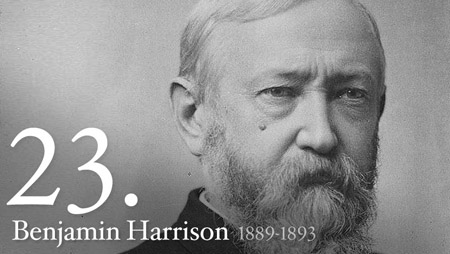
Benjamin Harrison, the 23rd President of the United States, served from March 4, 1889, to March 4, 1893. His presidency was marked by significant legislative achievements, economic challenges, and international diplomacy. This article provides a detailed timeline of Harrison’s presidency, highlighting key dates and events that defined his time in office.
Inauguration and Early Actions: March 1889
- March 4, 1889: Benjamin Harrison is inaugurated as the 23rd President of the United States. His inauguration follows the defeat of incumbent President Grover Cleveland in the 1888 election. Harrison’s inaugural address focuses on national unity, the protection of American industry, and the need for tariff reform.
- March 6, 1889: Harrison begins his presidency by appointing his Cabinet members, including James G. Blaine as Secretary of State, William Windom as Secretary of the Treasury, and Redfield Proctor as Secretary of War. The appointments reflect his commitment to experienced leadership and addressing key issues.
Legislative Achievements and Economic Policies: 1889-1891
- October 1889: The opening of the North and South Dakota territories as states is a significant event in Harrison’s presidency. North Dakota, South Dakota, Montana, and Washington are admitted into the Union during this period, reflecting the ongoing expansion of the United States.
- July 1890: The Sherman Antitrust Act is signed into law. This landmark legislation aims to curb monopolistic practices and promote fair competition by prohibiting trusts and monopolies that restrain trade. Harrison supports the Act, which becomes a key achievement of his presidency.
- October 1890: The McKinley Tariff Act is enacted, raising import duties to protect American industry from foreign competition. The tariff, which increases duties on a wide range of goods, reflects Harrison’s commitment to protectionism and economic policy favoring domestic industries.
- January 1891: Harrison addresses the issue of pension reform, advocating for the expansion of pension benefits for Civil War veterans and their families. His administration’s efforts to provide support to veterans reflect a commitment to honoring military service and addressing their needs.
Foreign Policy and Diplomacy: 1889-1892
- March 1890: The U.S. government negotiates the Bering Sea Arbitration with Great Britain to resolve disputes over fur-seal hunting rights. The arbitration helps settle tensions between the two nations and demonstrates Harrison’s commitment to resolving international disputes through diplomacy.
- June 1890: The Harrison administration is involved in negotiations with Chile over the Baltimore Incident, where American sailors were killed in a confrontation with Chilean authorities. The dispute is eventually resolved diplomatically, reflecting Harrison’s focus on maintaining positive international relations.
- 1891: The Pan-American Conference is held in Washington, D.C., with representatives from various Latin American countries. The conference aims to promote cooperation and trade among the American nations. Harrison’s support for the conference reflects his commitment to strengthening relations with Latin American countries.
Economic Challenges and Labor Issues: 1891-1892
- May 1891: The U.S. economy experiences a downturn due to the effects of the McKinley Tariff and other economic policies. Economic instability and the impact on industries lead to growing public dissatisfaction with Harrison’s administration.
- July 1892: The Pullman Strike, a major labor dispute involving the Pullman Company, leads to widespread unrest and violence. Harrison’s administration responds by sending federal troops to restore order, reflecting the administration’s approach to managing labor disputes and maintaining public order.
Reelection Campaign and Conclusion of Term: 1892-1893
- November 1892: Benjamin Harrison faces Grover Cleveland in the presidential election. Despite his legislative achievements and efforts to address economic and foreign policy issues, Harrison is defeated by Cleveland, who wins the election and returns to the presidency.
- March 4, 1893: Harrison’s presidency ends as Grover Cleveland is inaugurated for his second non-consecutive term. Harrison leaves office having navigated a range of challenges and implemented key policies during his time in office.
Post-Presidency and Legacy
- 1893-1901: After leaving the presidency, Harrison returns to private life and engages in various professional and personal activities. He resumes his law practice in Indianapolis and becomes involved in several civic and educational causes.
- 1901: Harrison serves as a delegate to the Philippine-American War peace negotiations, reflecting his continued interest in international affairs and diplomacy.
- March 13, 1901: Benjamin Harrison dies at the age of 67. His death marks the end of a distinguished career in public service, including his presidency and contributions to American law and diplomacy.
Legacy and Impact
Benjamin Harrison’s presidency is characterized by several key achievements and challenges:
- Legislative Achievements: Harrison’s support for the Sherman Antitrust Act and the McKinley Tariff Act reflects his administration’s focus on economic policy and regulation. The Sherman Antitrust Act remains a cornerstone of antitrust law, while the McKinley Tariff significantly impacts trade and industry.
- Foreign Policy: Harrison’s administration successfully resolves several international disputes and promotes diplomatic efforts, including the Bering Sea Arbitration and the Pan-American Conference. These efforts reflect his commitment to maintaining positive relations with other nations.
- Economic and Labor Issues: Harrison faces economic challenges and labor unrest during his presidency, including the effects of the McKinley Tariff and the Pullman Strike. His administration’s response to these issues highlights the complexities of managing economic and labor-related challenges.
- Political Challenges: Harrison’s presidency is marked by political controversies and challenges, including the impact of his economic policies on public opinion. Despite these challenges, his presidency is noted for significant legislative and diplomatic accomplishments.
Conclusion
Benjamin Harrison’s presidency, while not as widely remembered as some of his predecessors or successors, played a crucial role in shaping American policy and governance during the late 19th century. His efforts to address economic and foreign policy issues, coupled with his legislative achievements, contribute to his legacy as a leader who navigated complex challenges during his time in office. Harrison’s presidency remains an important part of American history, reflecting the dynamic nature of U.S. politics and governance during the Gilded Age.